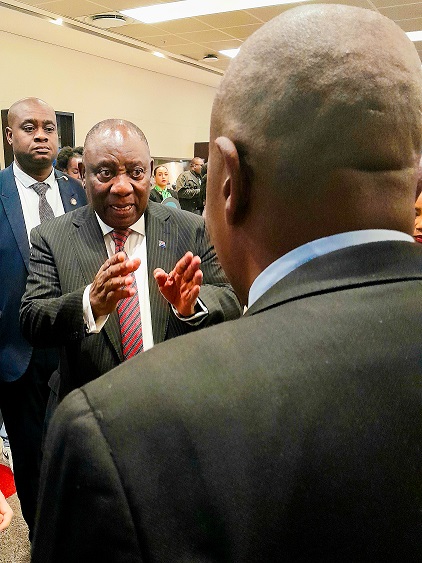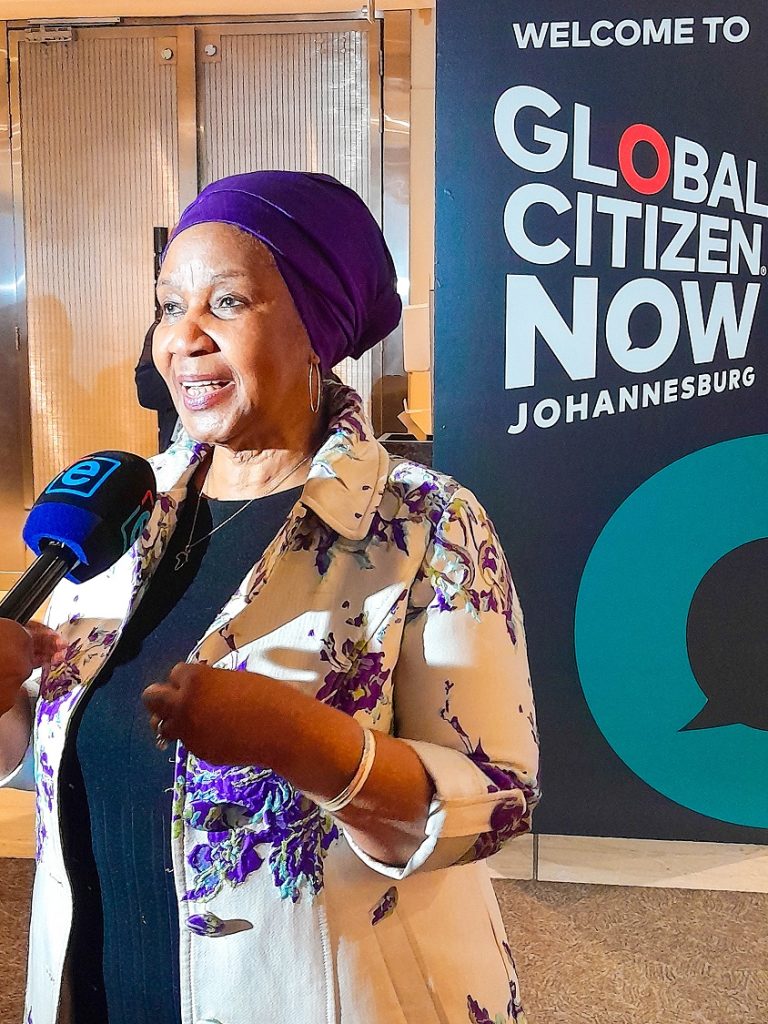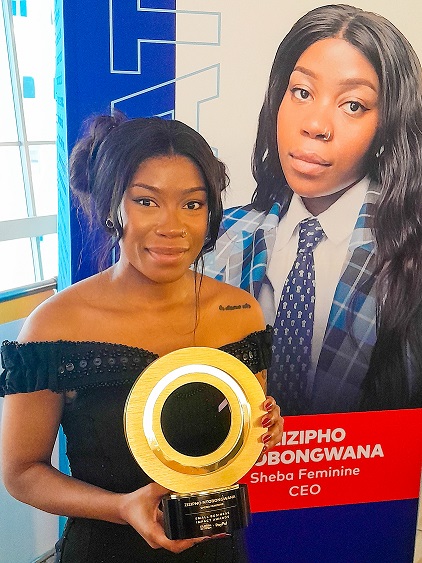AMONG international participants who partook in the Global Citizen NOW summit which coincided with the G20 Leaders’ Summit around Johannesburg over the past weekend, was 31-year-old East London entrepreneur Zizipho Ntobongwana – who was recognized with an inaugural Global Citizen and PayPal Small Business Impact Award, at the Sandton Convention Centre on the Friday afternoon of November 21.
Founder and CEO of Sheba Feminine, a South Africa-based entity which creates sustainable and inclusive period products, the Mthatha-born lass was part of a quintet from around the globe honoured for their diverse contribution of solutions towards current societal challenges.
An alumna of the all-girls St. Anne’s Diocese College in KwaZulu-Natal (where she suggests the seed of her involvement in reproductive health was sown), the Masters in Management and Sustainability student at the University of Galway in Ireland states on her website to have started her made-by-women brand in 2017 after she’d posed some questions during her period:
What’s in the product I’m using? Who makes them? What impact do they have on the planet?
Rattled by discovering harmful synthetics in most menstrual products which moreover contributed to environmental waste, that spurred her to intervene, prompted by empowerment, sustainability and inclusivity – which resulted in her taking up the cudgels on behalf of females through the creation of a brand which presently provides organic, biodegradable products which care for both their bodies and the planet.
Driven by an ambition which envisions a future whereby menstrual health is universally embraced, sustainable and accessible, Ntobongwana asserts that her brand isn’t just about products – rather, also a movement to end stigma, promote menstrual equity and reimagine care for menstruators everywhere.
The movement she alludes to entail pushing the mission of sexual health care through workshops targeted at needy communities, at which, inter alia, trained facilitators destigmatize the shame associated with reproductive and sexual health care.
To this end, girls as young as 10-year-old constitute beneficiaries of Ntobongwana’s educational initiative.
To date, her brand has donated over 10 000 pads to those in need – in addition to the “Pay for a Pal’s Pad” initiative which encourages those who can afford to contribute menstrual products for young girls, so as to ensure they remain in school, instead of missing class when nature calls.
Sheba Feminine’s products range from tampons to menstrual cups, et cetera, and they are manufactured locally and beyond.
Ntobongwana’s operation is assisted by three employees whilst she works remotely from Ireland. “I try not to micro-manage, because I trust my team,” she pointed out.
A recipient of the Kader Asmal Fellowship Programme (a fully funded scholarship offered to South African students to study at Master’s level in Ireland), the jovial businesswoman described having to juggle studying with work obligations a difficult but nonetheless fascinating experience she is enjoying. The awardee said that she regarded the award as a significant enabler to “push the mission we’re trying to get to.”
The University of Cape Town Honours claimant had entered the contest for the award through an advertised open application. She revealed she was subjected to scrutiny involving three rounds of adjudication – which included due diligence – done entirely virtually.
That per se casts into perspective the impact of the credential.
Neither was it easy for Ntobongwana to be selected as a grantee of the Master’s scholarship programme.
During a panel discussion moderated by PayPal executive Otto Williams, in which Ntobongwana and her fellow recipients from Argentina, India, Sweden and the US featured – they discussed their entrepreneurial journeys and how they are reimagining what is possible when innovation meets purpose.
As a hint to how big a deal the summit in which Ntobongwana starred is, some of the high-profile participants to the G20 Leaders’ Summit – who numbered South Africa’s President Cyril Ramaphosa, President of the European Commission Ursula von der Leyen, Prime Minister of Ireland Taoiseach Micheál Martin, Prime Minister of Norway Jonas Gahr Støre, et al. – also featured in the gathering’s various panels which tackled topics such as Global Health Security, Energy Access, Financing Africa’s Future, etc.
On a panel which discussed Scaling Up Renewables Africa, Ramaphosa decried what he referred to as an energy paradox which affects 40% of Africa’s population despite the continent possessing an abundance of renewable energy resources.

Summarizing the status quo, he said: “This energy poverty impacts nearly every facet of life, from clean cooking to access to medicines, to quality education, to economic activity.”
He continued: “The Scaling up Renewables in Africa initiative was born of the need to expand energy access across the continent. We support an energy-secure future for Africa that harnesses the human and technological potential of the continent.
Africa’s vast potential must be harnessed for the benefit of its people and the world.”
Co-Founder & CEO of Global Citizen, Hugh Evans surmised: “Africa’s renewable energy future is one of the greatest opportunities of our generation. With vast solar, wind and hydro resources and a young, dynamic population ready to lead, the continent’s potential is unparalleled.”
At the summit, the European Commission, governments and multilateral development banks unveiled €15.5 billion in renewable energy support for Africa. An entity with over 30 years of experience in the renewable energy sphere named ENERTRAG announced its plan to deliver 1.2 gigawatts of grid-secure renewable power in South Africa from 2026, enough to supply over 800,000 homes and benefit up to 2.8 million people.
Other notable South Africans who participated in the colloquium included erstwhile UN Under-Secretary-General Dr. Phumzile Mlambo-Ngcuka, singer Yvonne Chaka Chaka, actress Pearl Thusi, et al. Thusi’s fellow actress, Nomzamo Mbatha – who is a Global Citizen Ambassador – hosted the rendezvous.
Global Citizen NOW: Johannesburg marked the culmination of the year-long campaign to Scale Up Renewables in Africa, and highlighted new commitments to build infrastructure, create jobs and advance Africa’s clean energy future.
The summit saw the announcement of new projects that will expand electricity access to power over 17.5 million homes and deliver 26.8 gigawatts of clean energy across the continent by 2030.
Image Jacob MAWELA (Zizipho Ntobongwana, the Founder and CEO of Sheba Feminine limned with her PayPal Small Business Impact Award at the Global Citizen NOW summit at the Sandton Convention Centre).


